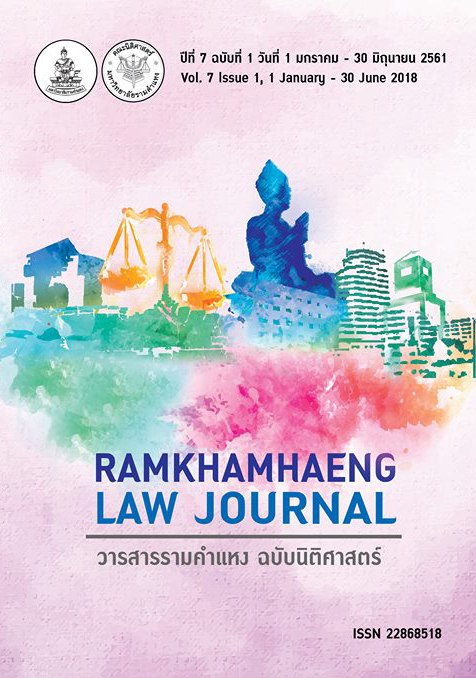กฎหมายเพื่อการพัฒนาความสามารถในการแข่งขันของธุรกิจโลจิสติกส์
Main Article Content
Abstract
The main objective of this research is to suggest legal measures that are adequate to promote the logistics service business. The research was carried out by a qualitative research including legal research and conducting interview the two groups of informants i.e. public sector and private sector with a purposive sampling technique and a snowball technique.
The fact finding revealed that in the overview, the logistics businesses of the world, ASEAN, and Thailand are being interconnecting as the global value chains. The logistics is a nucleus of moving forward world economy efficiently and various countries are enthusiastic to develop their own domestic logistics business and systems to enhance competitive capacity. The research also found that public sector and private sector of Thailand have acknowledgement and roles to the relation between obligations of the agreement on trade in services (GATS and AFAS) under supervision of World Trade Organization and ASEAN. In addition, the research found that several Thai laws relating to logistics business are scattering in many government agencies’ responsibilities, too detailed for the entrepreneurs to comprehend and consequently, violate them in the end and being burdensome unnecessarily to the entrepreneurs. Besides, some sections of those laws are not complied with principle and characteristics of good law i.e. unclear, inflexible, non-adjustable to changing world economy and advanced technology. The law enforcement has not yet been fair, transparent and adequate to support business and fair competition as well as not in accordance with principle of liberalization of trade in services which emphasizes on non-discrimination. This research suggested rearranging related laws to be systemized i.e. merge several subsidiary laws to be easy for access and comprehension, regulating use of discretion to be definite, transparent and accountable and, eventually, improving substantive laws having limitations on investment and business operation for preparedness of liberalization of trade in services in pursuance with Thailand’s obligations bound under GATS and World Trade Organization’s supervision and bound under ASEAN Framework Agreement on Services (AFAS).
Article Details
References
ไชยยศ ไชยมั่นคง และ มยุขพันธ์ ไชยมั่นคง. กลยุทธ์โลจิสติกส์และซัพพลายเชนเพื่อแข่งขันในตลาดโลก. นนทบุรี: สำนักพิมพ์ซี.วาย. ซิซเทิม พริ้นติ้งจำกัด, 2550.
ธนิต โสรัตน์. ความรู้เกี่ยวกับลอจิสติกส์เบื้องต้น Basic of Logistics [Online]. Available URL: https://www.v-servelogistics.com, 2560 (ธันวาคม, 12).
บริษัท เอฟฟินิตี้ จำกัด. โครงการศึกษาการเพิ่มขีดความสามารถในการแข่งขันของอุตสาหกรรมโลจิสติกส์ไทย. สนับสนุนโดยสำนักงานและคณะกรรมการพัฒนาเศรษฐกิจและสังคมแห่งชาติ. กรุงเทพมหานคร: ศูนย์ความเป็นเลิศด้านโลจิสติกส์, 2552.
ปุ่น เที่ยงบูรณธรรม และคณะ. โครงการการศึกษาเบื้องต้นเพื่อเตรียมรองรับการพัฒนาเศรษฐกิจ ตามแนวเส้นทางระเบียงเศรษฐกิจตะวันตก – ตะวันออก กรณีโลจิสติกส์ด้านการค้าชายแดนและการค้าผ่านแดน. สำนักงานกองทุนสนับสนุนการวิจัย. กรุงเทพมหานคร: สำนักงานกองทุนสนับสนุนการวิจัย, 2550.
สถาบันนานาชาติเพื่อเอเชียแปซิฟิกศึกษามหาวิทยาลัยกรุงเทพ. การเปิดเสรีโลจิสติกส์อาเซียน : โอกาสผลกระทบและการปรับตัวของผู้ประกอบการไทย. กรุงเทพมหานคร: สถาบันนานาชาติเพื่อเอเชียแปซิฟิกศึกษามหาวิทยาลัยกรุงเทพ, 2553.
สถาบันวิจัยเพื่อการพัฒนาประเทศไทย. โครงการการจัดทำเขตการค้าเสรีไทย-สหรัฐอเมริกา ในภาคการขนส่งและโลจิสติกส์. [Online]. Available URL: https://tdri.or.th/2012/11/a130/, 2548 (มิถุนายน, 26).
สิทธา เจนศิริศักดิ์ และคณะ. โครงการองค์ความรู้และประเด็นการวิจัย เพื่อการพัฒนาด้านโลจิสติกส์และโซ่อุปทานไทยระดับมหภาค สู่ประชาคมเศรษฐกิจอาเซียน : พื้นที่ภาคตะวันออกเฉียงเหนือ. กรุงเทพมหานคร: สำนักงานกองทุนสนับสนุนการวิจัย, 2555.
Ackerman, K. B. “Pitfalls in logistics partnerships.” International Journal of Physical Distribution & Logistics Management 26, 3 (1996): 35-37.
Aertsen, F., “Contracting-out the physical distribution function: a trade-off between asset specificity and performance measurement.” International Journal of Physical Distribution & Logistics Management 23, 1 (1993): 23-29.
ASEAN Secretariat. Logistics Services [Online]. Available URL: https://www.asean.org/ communities/ asean-economic-community/category/logistics-services, 2012 (June, 15).
Berglund, M., van Laarhoven, P., Sharman, G., and Wandel, S., “Third party logistics: is the future.” International Journal of Logistics Management 10, 1 (1999): 142-156.
Daudin, G., Rifflart, C., and Schweisguth, C., “Who produces for whom in the world economy?.” Canadian Journal of Economics 14 (2011): 03-37.
Freund, C., and Rocha, N. “What Constrains Africa’s Exports?.” World Bank Economic Review 25, 3 (2010).
Goh, M, and Parooj, P., “Logistics Management Practices and Development in Thailand.” Logistics Information Management 11, 6 (1998): 122-141.
Malmborg, H. and Richardson, A., The Logistics Strategy for Wilson Logistics. Graduate Business School, 2000.
Mattoo, A. and Wunsch, S., Preempting Protectionism in Services: The GATS and Outsourcing. World Bank and Institute for International Economics, 2004.
Sung, W. L., Overview of Inland Connections and Logistic System in ASEAN. Seoul: Korea Maritime Institute, 2013.
UNCTAD Secretariat. Managing the request-offer negotiations under the gats: logistics services revised Draft [Online]. Available URL: https://webcache. googleusercontent.com/search?q=cache:gpm05H5jRMkJ: https://vi.unctad.org/ resources-mainmenu64/digitallibrary%3Ftask%3Ddl_doc%26doc_name% 3D276_ditc_tnc+&cd=1&hl=th&ct=clnk&gl=th, 2006 (June, 1).
Vaidyanathan. G., “A Framework for Evaluating Third-Party Logistics,” Communications of the ACM 48, 1 (January 2005). pp. 84-94.
The World Bank. Connecting to Compete, 2012: Trade Logistics in the Global Economy. The Logistics Performance Index and Its Indicators (LPI) [Online]. Available URL: https://siteresources.worldbank. org/TRADE/Resources /239070-1336654966193/LPI_2012_final.pdf, 2012 (June, 15).
_____. World Bank Data Indicators. World Bank [Online]. Available URL: https:// data.worldbank.org/indicator, 2013.
World Economic Forum. Outlook on the Logistics & Supply Chain Industry 2012 Geneva: World Economic Forum, 2012.

